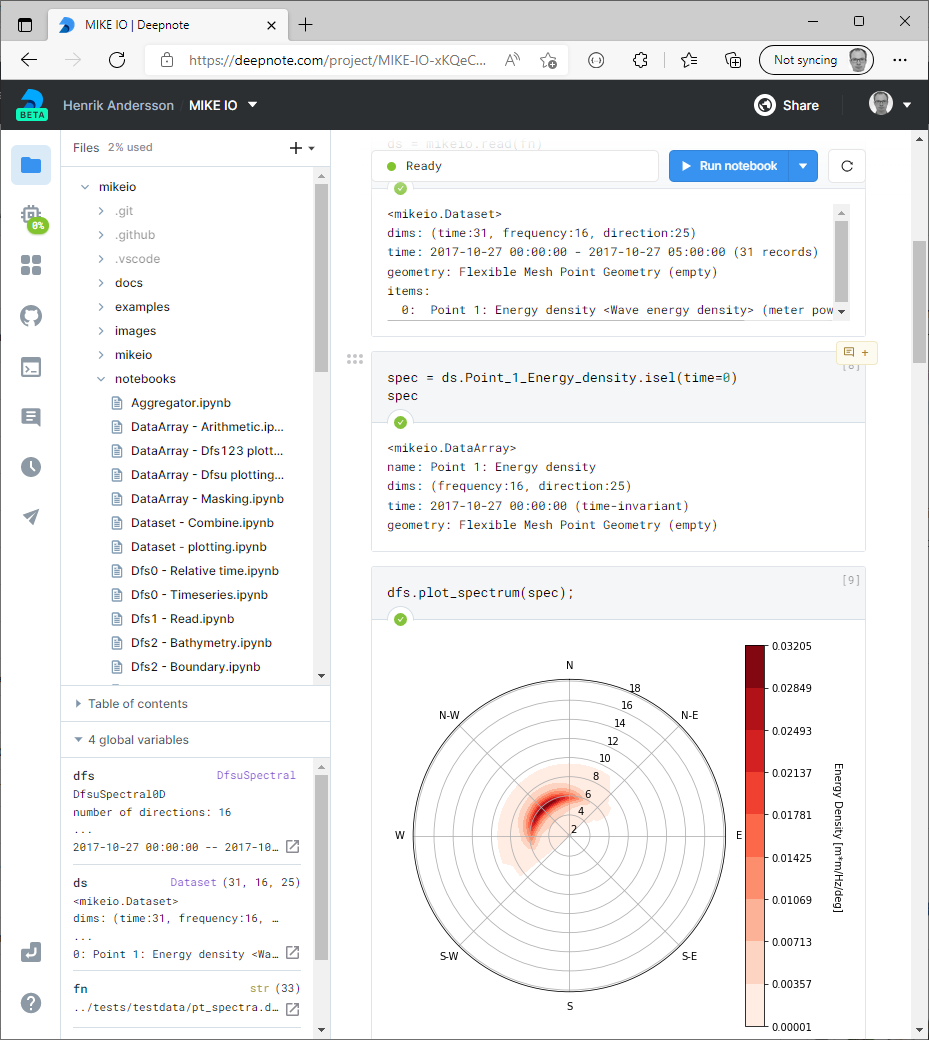Read, write and manipulate dfs0, dfs1, dfs2, dfs3, dfsu and mesh files.
MIKE IO facilitates common data processing workflows for MIKE files in Python.
📢 Sign up for the online instructor-led course here!
MIKE IO 1.0 is now available and it has a lot of benefits to working with dfs files even easier than before.
- New class
mikeio.DataArraywhich will be the main class to interact with, having these properties and methods- item info
- geometry (grid coordinates)
- methods for plotting
- methods for aggreation in time and space
- Indexing into a dataset e.g.
ds.Surface_elevationto get a specific item, will not return a numpy array, but amikeio.DataArray
- Windows or Linux operating system
- Python x64 3.7 - 3.10
- (Windows) VC++ redistributables (already installed if you have MIKE)
- Documentation - https://dhi.github.io/mikeio/
- General help, new ideas and feature requests - GitHub Discussions
- Bugs - GitHub Issues
From PyPI:
pip install mikeio
Or development version:
pip install https://github.com/DHI/mikeio/archive/main.zip
MIKE IO is tested extensively.
See detailed test coverage report below:
---------- coverage: platform linux, python 3.10.4-final-0 -----------
Name Stmts Miss Cover
-----------------------------------------------------
mikeio/__init__.py 39 2 95%
mikeio/base.py 26 5 81%
mikeio/custom_exceptions.py 25 8 68%
mikeio/data_utils.py 127 22 83%
mikeio/dataarray.py 927 145 84%
mikeio/dataset.py 722 92 87%
mikeio/dfs0.py 284 33 88%
mikeio/dfs1.py 62 6 90%
mikeio/dfs2.py 244 42 83%
mikeio/dfs3.py 201 15 93%
mikeio/dfs.py 275 30 89%
mikeio/dfsu.py 699 63 91%
mikeio/dfsu_factory.py 41 2 95%
mikeio/dfsu_layered.py 186 23 88%
mikeio/dfsu_spectral.py 128 7 95%
mikeio/dfsutil.py 104 8 92%
mikeio/eum.py 1297 3 99%
mikeio/generic.py 396 9 98%
mikeio/helpers.py 16 5 69%
mikeio/interpolation.py 63 1 98%
mikeio/pfs.py 93 0 100%
mikeio/spatial/FM_geometry.py 1123 116 90%
mikeio/spatial/FM_utils.py 293 30 90%
mikeio/spatial/__init__.py 0 0 100%
mikeio/spatial/crs.py 50 25 50%
mikeio/spatial/geometry.py 88 33 62%
mikeio/spatial/grid_geometry.py 497 33 93%
mikeio/spatial/utils.py 38 0 100%
mikeio/spectral_utils.py 89 5 94%
mikeio/xyz.py 12 0 100%
-----------------------------------------------------
TOTAL 8145 763 91%
============ 561 passed in 74.58s (0:01:14) ============
It is possible to run MIKE IO in your favorite cloud notebook environment e.g. Deepnote, Google Colab, etc...





